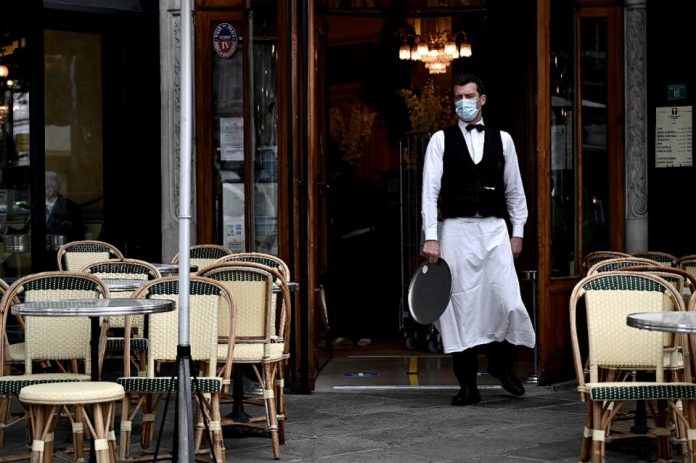
Staff at restaurants in most countries are required to wear masks to limit the spread of the … [+]
AFP via Getty Images
Marie Labrosse a master’s student in English Literature at McGill University contributed to this story.
Dennis Stevens, owner of Nostos in Mexico City, Lenny Lighter, general manager of Moishes, and Antonio Park, owner of Park, both in Montreal have all had to shut down their restaurant to customers since the start of the Covid-19 pandemic. Each of the restauranteurs has responded to the pressures of the pandemic in their own way.
With their restaurant closed and without a delivery or takeout option available as of yet, Moishes has mainly been reliant on its retail branch for revenue. Although the demand in supermarkets for Moishes’ meats or its famous coleslaw has been high, its retail business cannot make up for the losses incurred by the restaurant’s closure.
Park, on the other hand mobilized members of his staff to resume activities at the restaurant as soon as he could. After two weeks of confinement with his family in Montreal, he knew that he could not idly wait for the pandemic to pass him by.
“I cooked for two weeks at home and it was fine, but I knew that it wasn’t enough. I had to do something more,” Park recollects.
Park delivers a lunch and an evening menu of sushi and other Japanese and Korean dishes, similar to what used to be on offer at his restaurant pre-pandemic. Each day the restaurant sees a healthy flow of orders come in; however, the delivery model cannot match the revenues that Park is accustomed to. The restaurant has reduced the selling point of its food and is spending less on staffing, but it continues to order fish from Japan, Hawaii, New Zealand, and Mexico, which costs approximately 30 per cent more than it used to before the onset of the pandemic.
“I could lower the quality and do the same thing and make money, but I don’t want to do that,” Park explained. “I want to maintain the same quality because the restaurant is known for the quality of its fish.”
Like Park, Stevens has also been prioritizing his produce’s quality throughout the pandemic. Since the start of the shutdown, he has stopped purchasing Canadian salmon and lobster, but he still flies in fresh fish from the coast of Mexico every day. While the cost of cargo has not had an impact on his restaurant’s finances, the choice of fish is more limited.
Stevens has stepped up his service to ensure that clients remain satisfied despite the changed circumstances. Customers still get to choose their fish as they would at Nostos, but in the days of social distancing they do so via message. The dishes arrive on Nostos’ dishware, which clients can return or have picked up to retrieve their deposit. Customers who order the salt-crusted fish, receive a video instructing them on how to open their own fish at home.
In Montreal, restaurants will be permitted to reopen on Monday, June 22. However, Park and Lighter will not be able to offer the same dining experience as they once did under the latest public health directives. Staff will be required to wear visors, menus will hang on the walls, and customers will have to be seated 2 metres apart. Lighter notes that decreasing restaurants’ capacity without finding a compromise on other expenses like rent will harm restaurants and their owners.
“The margins in this business are very thin by nature,” Lighter said. “To have the same expenses as before the pandemic but only operating at 50 per cent capacity will be extremely difficult.”
Park expects that he will have to continue to offer takeout and delivery services to mitigate the financial toll of reduced capacity.
In Mexico City, restaurants re-opened on June 15. Stevens has been hard at work in concert with local government to imagine what the post-pandemic restaurant will look like. His proposal recommends outdoor-dining only and a two metre distance between the backs of chairs. While Nostos has a large outdoor space, Stevens has recommended to his mayor that other local restaurants be granted a temporary permit to use the sidewalk or the street to be able to welcome more customers. Nostos has thermal cameras to detect fevers and all of their waiters and staff wear masks. Stevens has also vowed to offer free masks to all of his customers, which they are required to wear whenever they leave their table.
“We want to provide as many barriers as possible so that the virus can’t be transmitted in restaurants,” Stevens said.
As restaurants around the world begin to re-open, Stevens’ words will ring true for every owner trying to protect their business and their customers.











